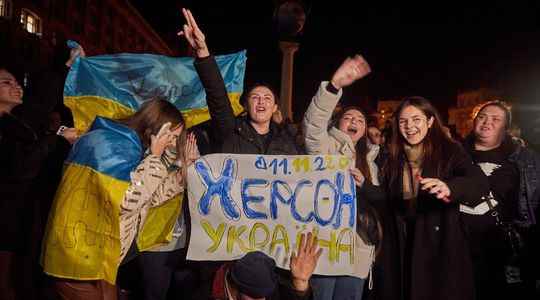These are the first celebrations in Ukraine since the start of the war, at the end of February. Friday evening, November 11, on the emblematic Maidan square in kyiv, residents of Kherson, refugees for months in the capital, celebrated the liberation of the city with jubilation. In the eponymous region, videos of civilians welcoming soldiers with arms laden with flowers have also been shared by the Ukrainian government.
“Today is a historic day”, welcomed President Volodymyr Zelensky during his daily address. While the special forces in turn entered the city, the Head of State specified that their first task would be to neutralize the numerous mines left by the Russian army, which had occupied Kherson since mid-March.
The United States hailed an “extraordinary victory” for Ukraine. “The only regional capital that Russia seized in this war is now back under the Ukrainian flag, which is quite remarkable,” National Security Advisor Jake Sullivan said. Emmanuel Macron also hailed an “important step” for Ukraine “towards the full restoration of its sovereign rights”.
This Russian withdrawal, announced on November 9, is the third on a scale since the start of the invasion on February 24, Russia having had to give up in the spring to take kyiv in the face of fierce resistance from the Ukrainians, before being driven out. of almost the entire Kharkiv region (north-east) in September. According to Moscow, “more than 30,000” Russian soldiers and “nearly 5,000 units of armaments and military vehicles have been withdrawn” from the western bank of the Dnieper to Kherson.
- Kherson is liberated but “the war continues”
But despite this victory, “the war continues” to liberate the country, said Dmytro Kouleba, Ukrainian Foreign Minister, on Saturday November 12. “I understand that everyone wants this war to end as soon as possible. Certainly we are the ones who want it more than anyone else,” he said.
Voices in favor of negotiations have been rising for several weeks among Westerners, after 9 months of fighting and military support. On November 9, the American Chief of Staff Mark Milley had notably hoped for talks to end the war, a military victory being, according to him, not possible for either Russia or Ukraine. Emmanuel Macron also exchanged with leaders from the South demanding the opening of “negotiations”, on the occasion of the Paris Forum for Peace, on November 10. “This war triggers famine” in “the southern hemisphere”, notably recalled the Argentine President Alberto Fernandez. Emmanuel Macron has also been highlighting for months the need to ultimately achieve “peace” negotiated between Ukrainians and Russians.
But for Ukraine, “as long as the war continues, and we see Russia mobilizing more conscripts and bringing more weapons to Ukraine, we will continue to count on your continued support,” the Minister of Foreign Affairs said. Foreign affairs after the recapture of Kherson. The Ukrainian president repeated this week that the first condition for a negotiation was the complete withdrawal of Russian troops, which entered Ukraine on February 24.
- Negotiation between the UN and Russia on fertilizer exports
Senior representatives of the UN and Moscow entered delicate negotiations on Friday over Russian fertilizer exports. In July 2022, an international agreement establishing the principle of protection of Russian exports of fertilizers and food products, as well as Ukrainian grain exports, was adopted. Wrested with great struggle under the aegis of the UN and Turkey, it is considered essential to avoid a new surge in prices and that millions of people suffer from hunger.
If the Netherlands recently authorized a shipment of Russian fertilizer to Malawi, the part concerning Russia has generally remained a dead letter, to the great displeasure of Moscow, which sees double standards in this. Because Ukraine, for its part, has already been able to export more than 10 million tonnes of cereals, according to the Food and Agriculture Organization of the United Nations (FAO), which has lowered prices and allowed provide aid to poor countries. On Friday, November 11, the European Commission and several development banks also announced that they were mobilizing one billion euros to facilitate the export of cereals from Ukraine despite the Russian offensive and the threat of blocking the Black Sea ports.
But this agreement on Ukrainian exports is set to expire on November 19, and Moscow has not yet agreed to extend it. The current discussions between Russia and the UN are therefore crucial. The UN representatives informed their Russian counterparts “of the initiatives taken to facilitate payment, insurance as well as access to the ports of the European Union of Russian cereals and fertilizers”, indicates a press release. “The world cannot afford to let global fertilizer accessibility issues become a global food shortage,” they say.
- Russia forbids its soil to the Biden brothers
Moscow has announced that it will ban entry into its territory of 200 Americans, including two brothers and a sister of President Joe Biden, as well as his spokesperson Karine Jean-Pierre, in response to American sanctions targeting Moscow. His wife and daughter had already been banned from entering in June, while Joe Biden had been banned.
This decision was taken “in response to the increasingly broad sanctions of the administration of Joe Biden, not only against Russian officials (…), but also of all those who do not please Washington for one reason or another,” the Russian Foreign Ministry said in a statement. Washington had earlier sanctioned members of Vladimir Putin’s family, including his two daughters, and the Russian president himself.
Also on the list is independent Vermont Senator Bernie Sanders, who has strongly criticized the Russian offensive, politicians and members of the Biden administration. Moscow accuses them of being “involved in promoting a Russophobic campaign and supporting the kyiv regime”.
